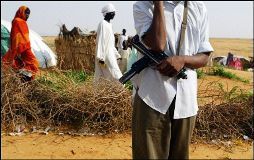U.N. team says Sudanese displaced still face attacks
By DANIEL BALINT-KURTI, Associated Press Writer
AL-FASHER, Sudan, Aug 29, 2004 (AP) — Security has improved inside camps in Sudan’s violence-torn Darfur region, but displaced villagers still face attacks and abuse when they leave the camps, a U.N. team said Saturday, wrapping up a mission that could determine whether Sudan is hit with international sanctions.
 Darfur rebels, meanwhile, said government forces and Arab militiamen continue to bomb and torch villages and kill civilians – with attacks on six villages in the past three days, including one that killed 64 people. The rebels said they would hold a 24-hour boycott of peace talks with the Sudanese government to protest.
Darfur rebels, meanwhile, said government forces and Arab militiamen continue to bomb and torch villages and kill civilians – with attacks on six villages in the past three days, including one that killed 64 people. The rebels said they would hold a 24-hour boycott of peace talks with the Sudanese government to protest.
More than 1 million black African villagers have been driven from their homes by the militiamen known as the Janjaweed, who are allegedly backed by the government. Many of the villagers are in 147 camps scattered across Darfur, a region the size of France.
An estimated 30,000 have been killed in the violence, which began in February 2003 when African rebel groups began an anti-government campaign. The latest attacks reported by the rebel negotiators could not be independently confirmed.
The United Nations has given Sudan until Aug. 30 to start acting to stop the militiamen or else face possible sanctions. Khartoum has said it is trying to restore security and denies any links to the Janjaweed.
Erick De Mul, who headed one of three U.N. fact finding teams that spent three days in the Darfur region, refused to say Saturday whether he expected the United Nations to move to impose sanctions.
De Mul, the U.N. deputy humanitarian coordinator, said he saw improvements in the camps.
“Access to the IDPs (internally displaced people) is good and the government is cooperating. The safety, in broad terms, inside the camps is OK,” he told reporters after a final meeting with Sudanese officials in al-Fasher, the capital of North Darfur.
“Outside the camps, it is still a problem. We are still hearing of attacks and abuses when people venture outside, despite the government’s effort of bringing in security forces,” he said.
Sudan’s president, Omar el-Bashir, said large numbers of African farmers forced from their land are heading home.
“There are no incidents reported now of the so-called Janjaweed terrorizing people and forcing them to flee their places to camps. On the contrary, there is a return from the camps to the villages,” said el-Bashir, who met in the capital, Khartoum, on Saturday with U.S. civil rights activist Jesse Jackson.
De Mul disputed that claim, saying returns are “still in initial stages … There are probably some, but very little.”
He called for further action to improve human rights and build African villagers’ confidence in the Sudanese police.
Sudan’s minister of humanitarian affairs, Ibrahim Hamid, who attended the meeting in al-Fasher, said he was “very satisfied with the results we have seen.”
He said it was normal many displaced people were too afraid to leave their camps and return to their villages. “A war-affected population will need some time to feel secure,” he said.
The Sudanese government says it has arrested an unspecified number of militiamen and sentenced some to death.
But Human Rights Watch, a U.S.-based advocacy group, accused the government of letting the militias maintain at least 16 bases in the region – including five apparently shared with the military.
De Mul and the two other teams will prepare a report by Aug. 31, and the Security Council is expected to meet Sept. 2 to discuss what steps to take next.
African rebels took up arms against Khartoum after long-simmering disagreements over land rights and other issues. The Sudanese government is accused of backing the Janjaweed in order to stamp out the rebellion.
At negotiations under way in Abuja, Nigeria, Darfur rebel groups said they would not participate in talks Sunday.
“A number of villages have been bombarded by helicopter gunships and Antonov aircraft while others have been attacked and torched over the last three days,” the groups said in a statement. They said they would return to talks on Monday.
The most recent attack took place Saturday at Klikel Abdousalaam village, where Sudan soldiers and the Janjaweed burned homes, killing two people, the insurgents said. In the deadliest attack, 64 civilians were killed and 156 wounded in the village of Yassin on Thursday, they said.
Sudanese government negotiators said they couldn’t confirm or deny the attacks and decried the rebel walkout.
Earlier Saturday, Sudan’s government ruled out any discussion at the Abuja talks of an African Union proposal to send up to 2,000 peacekeepers into the Darfur region.
The African Union has 150 troops in Darfur and is sending 150 more to protect observers monitoring a cease-fire that was called in April but has not been abided by.
